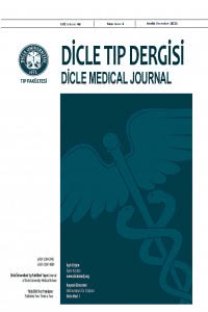Clopidogrel responsiveness in chronic kidney disease patients with acute coronary syndrome
Akut koroner sendromlu kronik böbrek hastalarında klopidogrel cevabı
___
- 1. Hamm CW, Bassand JP, Agewall S, et al. ESC guidelines for the management of acute coronary syndromes in patients presenting without persistent ST-segment elevation. Eur Heart J 2011;32:2999-3054.
- 2. Angiolillo DJ, Fernandez-Ortiz A, Bernardo E, et al. Variability in individual responsiveness to clopidogrel clinical implications, management, and future perspectives. J Am Coll Cardiol 2007;49:15051516.
- 3. Matetzky S, Shenkman B, Guetta V, et al. Clopidogrel resistance is associated with increased risk of recurrent atherothrombotic events in patients with acute myocardial infarction. Circulation 2004;109:31713175.
- 4. Cuisset T, Frere C, Quilici J, et al. High post treatment platelet reactivity identified low-responders to dual antiplatelet therapy at increased risk of recurrent cardiovascular events after stenting for acute coronary syndrome. J Thromb Haemost 2006;4:542549.
- 5. Buonamici P, Marcucci R, Migliorini A, et al. Impact of Platelet Reactivity After Clopidogrel Administration on Drug-Eluting Stent Thrombosis. J Am Coll Cardiol 2007;49:23122317.
- 6. Abbott KC, Cruess DF, Agodoa LY, et al. Early renal insufficiency and late venous thromboembolism after renal transplantation in the United States. Am J Kidney Dis. 2004;43:120 130.
- 7. Wattanakit K, Cushman M, Stehman-Breen C, et al. Chronic kidney disease increases risk for venous thromboembolism. J Am Soc Nephrol. 2008;19:135140.
- 8. Mahmoodi BK, Gansevoort RT, Veeger NJ, et al. Prevention of Renal and Vascular End-stage Disease (PREVEND) Study Group. Microalbuminuria and risk of venous thromboembolism. JAMA. 2009;301:1790 1797.
- 9. Park SH, Kim W, Park CS, et al. A comparison of clopidogrel responsiveness in patients with versus without chronic renal failure. Am J Cardiol 2009;104:12921295.
- 10. Angiolillo DJ, Bernardo E, Capodanno D, et al. Impact of chronic kidney disease on platelet function profiles in diabetes mellitus patients with coronary artery disease taking dual antiplatelet therapy. J Am Coll Cardiol 2010;55:11391146.
- 11. Cuisset T, Frere C, Moro PJ, et al. Lack of effect of chronic kidney disease on clopidogrel response with high loading and maintenance doses of clopidogrel after acute coronary syndrome. Thromb Res. 2010;126:400-402.
- 12. Levey AS, Greene T, Schluchter MD, et al. Glomerular filtration rate measurements in clinical trials. Modification of Diet in Renal Disease Study Group and the Diabetes Control and Complications Trial Research Group. J Am Soc Nephrol 1993;4:1159-1171.
- 13. Sibbing D, Braun S, Jawansky S, et al. Assessment of ADPinduced platelet aggregation with light transmission aggregometry and multiple electrode platelet aggregometry before and after clopidogrel treatment. Thromb Haemost. 2008;99:121126.
- 14. Weisser H, Von Pape K, Dzijan-Hom M, Calatzis A. Control of aspirin effect in chronic cardiovascular patients using two whole blood platelet function assays: PFA-100 and Multiple electrode aggregometry. Clin Chem Lab Med 2006; 44:81-198
- 15. Best PJ, Steinhubl SR, Berger PB, et al. CREDO Investigators. The efficacy and safety of short- and long-term dual antiplatelet therapy in patients with mild or moderate chronic kidney disease: results from the Clopidogrel for the Reduction of Events During Observation (CREDO) trial. Am Heart J 2008;155:687693.
- 16. Angiolillo DJ, Fernandez-Ortiz A, Bernardo E, et al. Platelet function profiles in patients with type 2 diabetes and coronary artery disease on combined aspirin and clopidogrel treatment. Diabetes 2005;54:24302435.
- 17. Soffer D, Moussa I, Harjai KJ, et al. Impact of angina class on inhibition of platelet aggregation following clopidogrel loading in patients undergoing coronary intervention: do we need more aggressive dosing regimens in unstable angina? Catheter Cardiovasc Interv 2003;59:2125.
- 18. Angiolillo DJ, Fernandez-Ortiz A, Bernardo E, et al. Platelet aggregation according to body mass index in patients undergoing coronary stenting: should clopidogrel loading-dose be weight adjusted? J Invasive Cardiol 2004;16:169 -174.
- 19. Angiolillo DJ, Bernardo E, Ramirez C, et al. Insulin therapy is associated with platelet dysfunction in patients with type 2 diabetes mellitus on dual oral antiplatelet treatment. J Am Coll Cardiol 2006;48:298 304.
- 20. Taubert D, Kastrati A, Harlfinger S, et al. Pharmacokinetics of clopidogrel after administration of a high loading dose. Thromb Haemost 2004;92:311 316.
- 21. Lau WC, Waskell LA, Watkins PB, et al. Atorvastatin reduces the ability of clopidogrel to inhibit platelet aggregation: a new drug-drug interaction. Circulation 2003;107:3237.
- 22. Morel O, Ghannudi S, Jesel L, et al. Cardiovascular Mortality in Chronic Kidney Disease Patients Undergoing Percutaneous Coronary Intervention Is Mainly Related to Impaired P2Y12 Inhibition by Clopidogrel. JACC 2011;57:399-408.
- 23. Htun P, Fateh-Moghadam S, Bischofs C, et al. Low Responsiveness to Clopidogrel Increases Risk among CKD Patients Undergoing Coronary Intervention. J Am Soc Nephrol 2011;22:627-633.
- ISSN: 1300-2945
- Yayın Aralığı: 4
- Başlangıç: 1963
- Yayıncı: Cahfer GÜLOĞLU
Persistent ectopic pregnancy after milking procedure: Case report
Semra KAYATAŞ, Didar KURT, Mustafa EROĞLU, Sevcan Arzu ARINKAN, Murat APİ
The effect of anesthesia type on the postoperative complications of major lower extremity surgery
Murat BAKIŞ, Sinem SARI, Ayhan Öznur CİLLİMOĞLU, Özgür ÖZBEY, Bakiye UĞUR, Mustafa OĞURLU
Dermoid kistlerde ultrasonografik tanı doğruluğunu etkileyen parametreler
YEŞİM BAYOĞLU TEKİN, ŞADIMAN KIYKAÇ ALTINBAŞ, F. Suat DEDE, Berna DİLBAZ
Üst gastrointestinal sistem yabancı cisimleri olan çocuklarda fleksibl endoskopik işlem
Kaan DEMİRÖREN, Ahmet Cumhur DÜLGER, Şehmus ÖLMEZ, VELİ AVCİ, SALİM BİLİCİ, Mehmet MELEK, Halit PULAT
Eflatun YÜCEDAĞ, Ayhan UYSAL, Oktay BURMA, İbrahim Murat ÖZGÜLER, Mehmet Cengiz ÇOLAK, Tansel Ansal BALCI
Our results of surgical treatment of supracondylar humeral fractures in children
Beşir DİKMEN, İbrahim Gökhan DUMAN, Raif ÖZDEN, Vedat URUÇ, Yunus DOĞRAMACI, Aydıner KALACI, Serhat KARAPINAR
Eflatun YÜCEDAĞ, AYHAN UYSAL, Oktay BURMA, İBRAHİM MURAT ÖZGÜLER, Mehmet Cengiz ÇOLAK, TANSEL ANSAL BALCI
Anesthesia experience along with familial Mediterranean fever and celiac disease
Mehmet SARGIN, Hale BORAZAN, Gülçin HACIBEYOĞLU, Şeref OTELCİOĞLU
Mehtap BOZKURT, Cüneyt GOCMEZ, Mehmet OKÇU, Gül TÜRKÇÜ, Serda EM, PELİN OKTAYOĞLU, Demet UÇAR, Kemal NAS
Kamil KARAALİ, MEHMET SEDAT DURMAZ, Koray Koraltan DEMİR, Cemil APAYDIN
